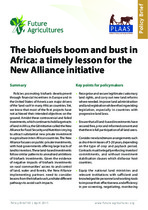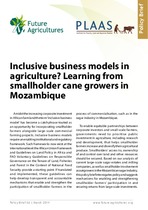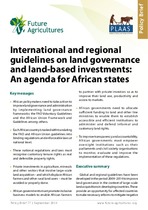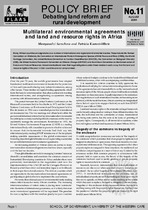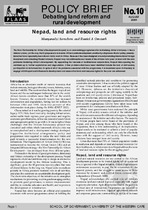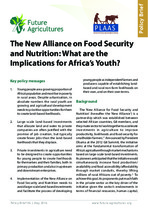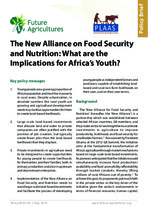Browsing Policy Briefs by Subject "Africa"
Now showing items 1-7 of 7
-
The biofuels boom and bust in Africa: A timely lesson for the New Alliance initiative
(Institute for Poverty, Land and Agrarian Studies, University of the Western Cape, 2015)Policies promoting biofuels development through financial incentives in Europe and in the United States of America are major drivers of the ‘land rush’ in many African countries. Yet, we know that most of the first projects ... -
Inclusive business models in agriculture? Learning from smallholder cane growers in Mozambique
(Institute for Poverty Land and Agrarian Studies (PLAAS), 2014)Amidst the increasing corporate investment in African farmland the term ‘inclusive business model’ has become a catchphrase touted as an opportunity for incorporating smallholder farmers alongside large-scale commercial ... -
International and regional guidelines on land governance and land-based investments: An agenda for African states
(Institute for Poverty, Land and Agrarian Studies, University of the Western Cape, 2014)Global and regional guidelines have been developed in the period 2009–2014 to improve land governance in the context of large-scale land acquisitions in developing countries. These provide an opportunity for affected ... -
Multilateral environmental agreements and land and resource rights in Africa
(Institute for Poverty, Land and Agrarian Studies, University of the Western Cape, 2004)Many African countries are signatories to a number of international and regional environmental treaties. These include the Ramsar Convention on Wetlands, the Convention on International Trade in Endangered Species of Wild ... -
Nepad, land and resource rights
(Institute for Poverty, Land and Agrarian Studies, University of the Western Cape, 2004)The New Partnership for Africa’s Development (Nepad) is an overarching programme for revitalising Africa’s fortunes. It has a visionary tone, yet the way that it proposes to overcome Africa’s underdevelopment uncritically ... -
The New Alliance on food security and nutrition: What are the implications for Africa’s youth?
(Institute for Poverty, Land and Agrarian Studies, University of the Western Cape, 2016)The ‘New Alliance for Food Security and Nutrition’ (hereafter the ‘New Alliance’) is a partnership which was established between selected African countries, G8 members, and the private sector to ‘work together to accelerate ... -
The new alliance on food security and nutrition: what are the implications for Africa’s youth?
(Future Agricultures Consortium, 2016)Young people are a growing proportion of Africa’s population and most live in poverty in rural areas. Despite urbanisation, in absolute numbers the rural youth are growing and agricultural development needs to prioritise ...

